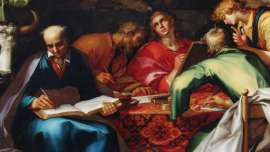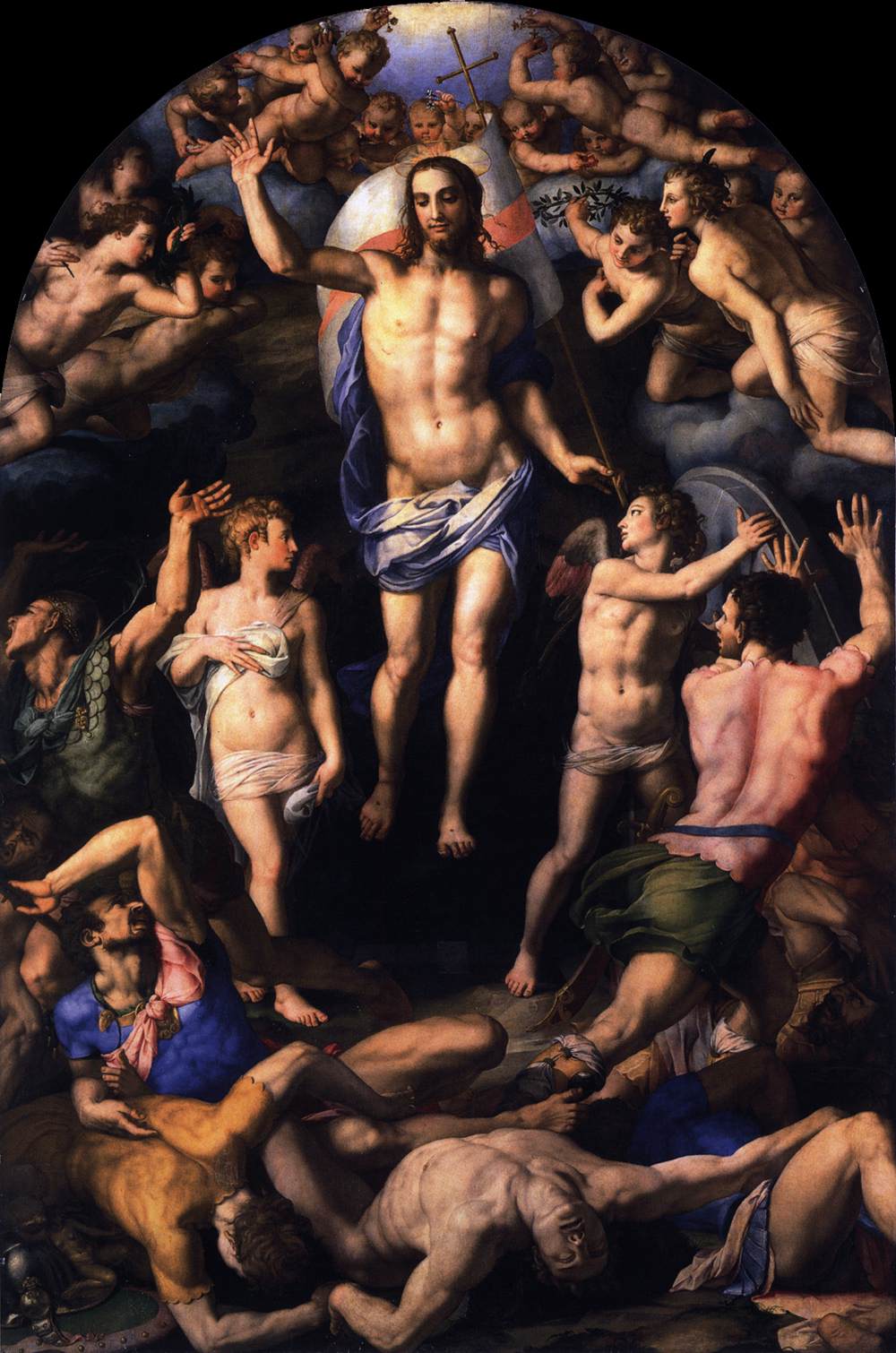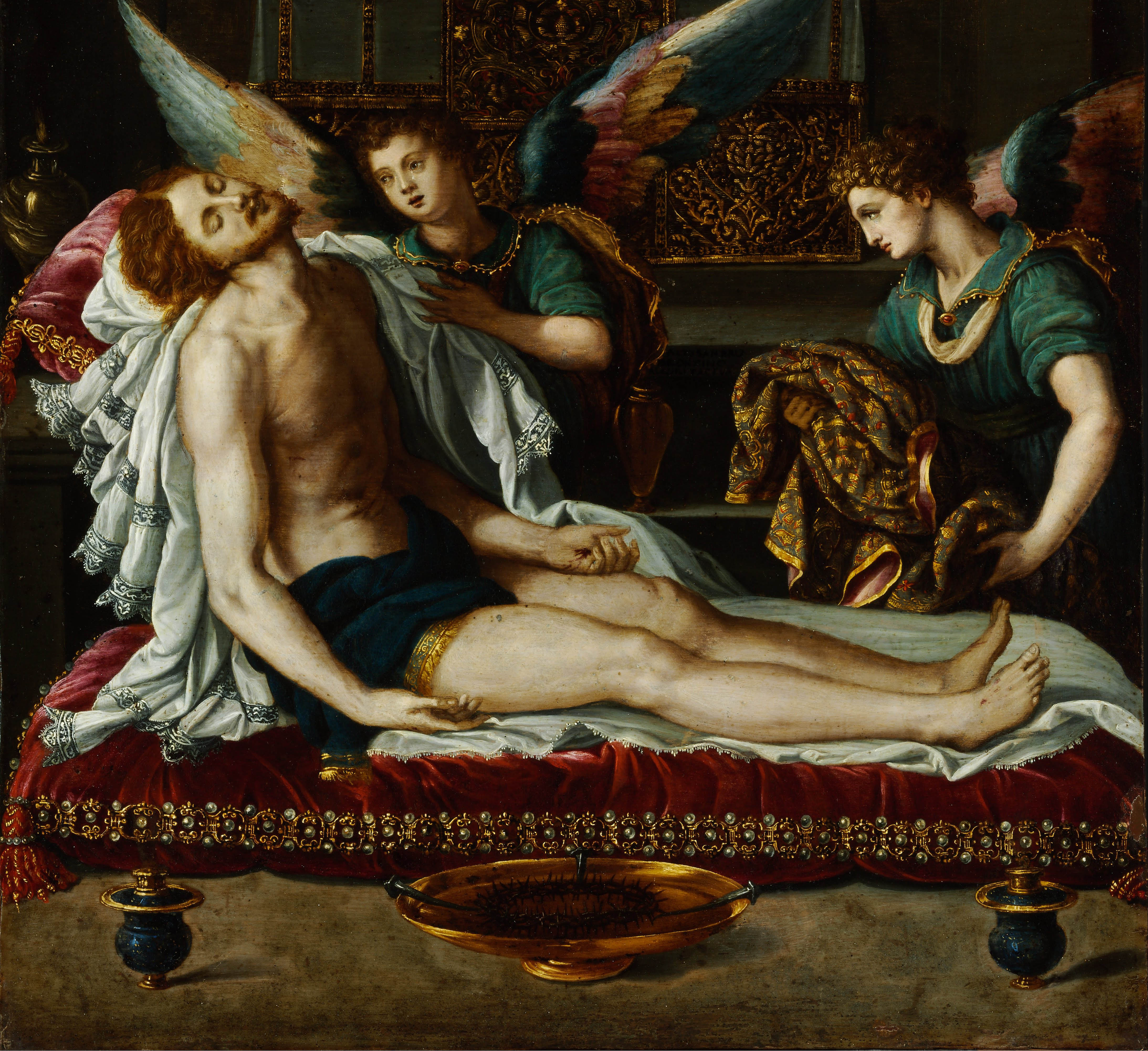Lesson Outline
I. Communion with the Word of God
A. The Lord Be With You
“The Lord be with you,” the priest prays at the very beginning of our Mass.
“And also with you,” we respond.
It’s a prayer of petition and at the same time it’s a statement of fact. It’s a petition in that we’re asking that the Lord be with us as we worship. And it’s a statement of fact in that we acknowledge that our prayer has already been answered. Jesus Christ promised to be with us when we gather in His name (see Matthew 18:20), and in the Mass He keeps His promise.
Jesus Christ is truly present to us in the Eucharist. But the Word of God (see John 1:1) is also truly present to us in the Scripture readings of the Liturgy of the Word.
Indeed, the Liturgy of the Word is a communion with the Word of God, just as the Liturgy of the Eucharist brings us into communion with the body and blood of Christ. As Christ comes to us in bread and wine, He comes to us, too, in the Word proclaimed to us in sacred Scripture.
In the Liturgy of the Word, we hear the story of our salvation – all the great events of salvation history, told to us and explained to us. And in the Liturgy of the Eucharist, through our communion with Christ in the bread and wine, we are joined to that story of salvation.
Our individual stories become a part of His story, the story of the salvation of the world, which reached its climax in His death and resurrection – which He has called us to remember in the Mass.
B. The Word on the Road
In our celebration of the Liturgy of the Word before the Liturgy of the Eucharist, we are following not only the biblical command of Christ, but the example He gives us in Scripture.
Remember the story of the road to Emmaus in Luke (see Luke 24:18-35)? Two of Jesus’ followers, walking from Jerusalem to the village of Emmaus, meet the resurrected Christ himself on the way – but in their grief and confusion over the His death, they fail to recognize Him.
As they walk, Christ interprets the Scriptures to them, showing them how Moses and the prophets foretold that all these things must happen to the Christ.
Arriving at Emmaus, they share a meal. But this is no ordinary meal. Recall the scene carefully. Notice Luke’s deliberate use of the same words used in his Last Supper narrative:At table, Jesus takes . . . blesses . . . breaks . . . and gives the bread (compare Luke 22:14-20).
As we said in our first lesson, Luke is giving us a picture of the Eucharist, the first to be celebrated after the Resurrection.
Notice the two-fold pattern: the Word of God is proclaimed, followed by the breaking of the bread. This, we recognize, is the pattern of the Mass.
First, the followers of Christ hear the word of God interpreted in the light of the Gospel (seeLuke 24:27). Jesus explains how the Scriptures teach the truth about Him, how all of salvation history was leading to the events His followers had just witnessed.
This is what happens in our Liturgy of the Word. We hear readings from the Old Testament and the New, carefully chosen by the Church to illuminate one another. We see how the promises of the Old Testament are fulfilled in the New, and how the New Testament sheds light on the mysteries of the Old.
With this preparation, we then approach the Eucharistic table. And in the breaking of the bread, we are brought into communion with the very mysteries of salvation history that we heard proclaimed in the Liturgy of the Word.
That’s why every time Scripture is read in the Mass, we make a confession of faith followed by an act of gratitude: “This is the Word of the Lord.Thanks be to God!”
II. God-Breathed
A. No Ordinary Book
That’s why before the priest reads the Gospel, he kisses the book; and before we listen, we trace the sign of the cross on our foreheads, lips and hearts, giving thanks and glory to God.
These are not empty gestures or rituals. We do these things for one crucial reason: because we are receiving Scripture as the first Christians received it — “not as a human word, but as it truly is: the Word of God” (see 1 Thessalonians 2:13).
And that’s why the Scriptures always have an honored place in our churches.
In many churches, the Book of the Gospels is elaborately bound, carried in processions, and placed centrally on the altar for the liturgy. It is the central object of the Liturgy of the Word, and we treat it with the respect due the Word of God.
Our respect for the Scriptures is nothing new. We can see the same profound respect in the New Testament writers.
When we see the word “Scriptures” in the New Testament, of course, it almost always refers to what we today call the Old Testament (see, for example, John 5:39 and Romans 1:2).
The Jews of Jesus’ time often referred to the Scriptures as “the Law and the prophets” (seeMatthew 5:17) – by which they meant all that we understand as the Old Testament today.
Jesus and His disciples, like all good Israelites of their time, understood that these were no ordinary books or writings. The Scriptures were “oracles of God” (see Romans 3:2) or “prophecies” (see 2 Peter 1:19-20) – not in the sense of predicting the future, but in the sense of being messages from God.
“All Scripture is inspired by God,” Paul writes (see 2 Timothy 3:16). The Greek word we translate “inspired” literally means God-breathed. And that’s a good way to think about the divine inspiration of Scripture.
As God fashioned Adam out of the clay of the earth and blew the breath of life into him (seeGenesis 2:7), and as the Holy Spirit overshadowed Mary (see Luke 1:35), God breathes HisSpirit into the words of Scripture, filling them with divine meaning and life-giving power.
B. Inspired Oracles of God
That’s why New Testament writers sometimes introduce quotes from the Old Testament with “as the Holy Spirit says” (see Hebrews 3:7; Acts 1:16). Scripture, the Apostle Peter said, is written by “human beings moved by the Holy Spirit [who] spoke under the influence of God” (see 1 Peter 1:21).
When Peter and the other New Testament authors spoke and wrote, they were being moved by the Holy Spirit, and they were writing under the influence of God.
Paul “wrote….according to the wisdom given to him” by the Holy Spirit, Peter said (see 2 Peter 3:15-16). Paul himself said: “We speak…not with words taught by human wisdom, but with words taught by the Spirit” (see 1 Corinthians 2:13).
And many of the writings we have from the New Testament were explicitly written to be read in the context of the Eucharistic celebration (see, for example, 1 Corinthians 1:2; 1 Timothy 1:1; Revelation 1:11; Colossians 4:16, 1 Thessalonians 5:27).
III. The Word in the Liturgy of Israel
A. The Place of Scripture
In joining their own Scriptures to that of the Old Testament in the celebration of the Eucharistic sacrifice, the early Church was continuing a tradition begun by Israel.
Since Scripture was believed to be the speech of God delivered through human instruments, it had an important place in the Israelites’ liturgy. Indeed, it held a place very similar to the place it occupies in our own Liturgy of the Word.
When Moses received the Law from God, he recited everything God had told him to the people. They responded “with one voice” that they would do everything God had told them (see Exodus 24:3). Then they offered sacrifice to God, and, in effect, were given communion in the “blood of the covenant” (see Exodus 24:4-8).
In just the same way, after we hear the Word of God in our Liturgy of the Word, we profess our faith “with one voice” in the words of the Creed. Then the priest offers the Eucharist, and we have communion in the “blood of the covenant” (see Mark 14:24), which is made present to us on the altar.
Much later in the history of Israel, we see a similar liturgical use of God’s Word in the reforms of King Josiah.
A priest had found the Book of the Law (the first five books of the Old Testament) that had been hidden during the reign of a wicked king (see 2 Chronicles 34:14-18).
The good King Josiah had the book read to the assembly of people, and vowed on behalf of the people to keep all the commandments in it (see 2 Chronicles 34:29-32). And, following the reading of the Word and the profession of faith, again we see a liturgical sacrifice (see 2 Chronicles 35:1-19).
B. The Liturgy of the Synagogue
When Jerusalem was destroyed and the people carried off to Babylon (see 2 Kings 25:8-12), the people could no longer worship at the Temple. Instead, they formed local congregations.
These “synagogues” (from a Greek word meaning “assemblies”) continued after the people were allowed to return to Jerusalem (see Ezra 1:1-4) as convenient places of meeting on the Sabbath.
When the exiles returned from Babylon and reestablished the worship of the true God in Jerusalem, the reading of Scripture formed the heart of their worship (see Nehemiah 8).
And this remained true in Jesus’ time. We can see a good picture of that synagogue liturgy early in Luke’s Gospel, where Jesus is invited to read the lesson of the day in the synagogue in Nazareth (see Luke 4:16-22).
Jesus reads the lesson from Isaiah, then interprets it in a sermon (see Luke 4:23-27) – just as today we hear readings and then an sermon interpreting the readings in our Liturgy of the Word.
IV. The Word in the Liturgy of the Church
A. The Scripture Fulfilled
Jesus’ participation in the synagogue liturgy at Nazareth marks a turning point in salvation history.
In effect, we see being played out what the Letter to the Hebrews later described: “In times past, God spoke in partial and various ways to our ancestors through the prophets; in these last days, He spoke to us through a Son” (see Hebrews 1:1).
Notice what happens at Nazareth.
Jesus reads a passage written long ago to Israel’s ancestors by the prophet Isaiah. And not just any passage from Isaiah. But Isaiah’s promise of the Messiah – who would be anointed by the Spirit and bring freedom for the oppressed, eyesight for the blind.
After reading Isaiah, Jesus says, “Today this Scripture passage is fulfilled in your hearing” (see Luke 4:21).
What God had once spoken through the prophets, was now being spoken by His Son. And in hearing the Son’s Word, all the Scriptures of old were fulfilled – that is, God was now making good on the promises of Scripture. Notice that He says the promises of Scripture are fulfilled “in your hearing.”
Until this moment at Nazareth, Israel’s liturgy had been one of expectation and hope: the congregation heard the words of Moses and the prophets, and prayed that the Messiah might come soon.
In Jesus, what was hoped for and anticipated has come to pass. Jesus, as He taught His disciples on that first Easter night, is the fulfillment of the Scriptures of Israel (see Luke 24:27,45).
And this reality of fulfillment is what we experience of the Liturgy of the Word in the Mass. In the Mass, all the promises of the old covenant are brought to fulfillment in our hearing, as we share in the blessings of the new covenant.
Notice, also, that our readings each Sunday follow the pattern of salvation history – beginning with the Old Testament and showing how the promises of that particular Old Testament reading are fulfilled in the New Testament of Jesus.
We are intentionally made, in each Mass, to re-read and re-live the great events of our salvation, the salvation we give thanks for in the Mass.
Sometimes the connections between the readings we hear at the Mass can be subtle. But the readings are always connected so as to reveal the unity of God’s saving plan from the Old Testament to the New, and how that plan continues in the Mass.
To illustrate this point, let’s take an example from a typical Sunday in “ordinary time” (that is, those weeks in the Church year that fall outside of Advent, Christmas, Lent, and Easter).
Let’s look at the readings for the 21st Sunday in Ordinary Time in Cycle A. (The Church’s readings follow a three-year cycle in which Matthew’s Gospel is read in Year A, Mark’s Gospel in Year B, and Luke’s Gospel in Year C).
The Old Testament reading for that Sunday is a prophecy from Isaiah, in which Isaiah promises that the “key” to the kingdom of David will be given to a new prime minister. He will be a father of the people of Israel and what he opens no one shall shut and what he closes no one shall open (see Isaiah 22:15, 19-23).
And in our hearing of the Gospel on that Sunday, Isaiah’s promise is fulfilled.
The Gospel selected by the Church is that of Jesus giving the “keys to the kingdom” to Peter. Further echoing Isaiah, Jesus says that what Peter binds on earth will be bound in heaven, and what he looses on earth will be loosed in heaven (see Matthew 16:13-20).
In the liturgy, the Church is showing us that Peter is the one prophesied by Isaiah, who will rule over the Kingdom of David’s Son – the Church.
If we listen carefully, we will hear these kinds of connections in each Sunday liturgy. (For more help in hearing these connections week-to-week, see our Sunday Bible Studies.)
B. Meeting Christ in Scripture
But Catholics do not come to Mass for Bible study.
The Liturgy of the Word is not simply a history lesson or an occasion for drawing moral and practical ethical lessons from Scripture.
In the Mass, through the readings, the Lord is truly with us, speaking to us, calling us to renew our covenant with Him, the covenant first entered into by our baptism.
So in our Liturgy of the Word, we continue the long tradition that goes back to the time of Moses, but now with the knowledge that Christ is with us.
From the Old Testament through the New and up to the present day, the people of God have always revered Scripture as the living and powerful Word of God.
From Moses on, we have always encountered that Word in a liturgical setting, as the centerpiece of our public worship. There we learn not only what God has to tell us, but also how the Word of God is still alive and working in our world today.
Christians recognize that the Word of God “became flesh and made his dwelling among us” (see John 1:14) in the person of Jesus Christ.
When we encounter the Word in the Liturgy of the Word, therefore, we are doing more than hearing the story of our faith and the wisdom of its teachers. In a very real way, we are encountering Christ himself.
This is why we show such profound reverence for the Word of God in our Liturgy of the Word. We bind it in beautiful books that are works of art in themselves; we carry it in processions with candles and incense; we proclaim it loud and clear in front of the whole assembly; we meditate on it and hear it interpreted for us by the wisdom of the Church.
We do these things because we know we are encountering Christ, the Word Who “was in the beginning with God” (see John 1:2).
It is this encounter with the Word in Scripture that prepares us for the miracle of the Eucharist, in which we will come face to face with the Word made flesh.
In the Word proclaimed in the Mass, we re-live the mystery of salvation. In the bread and wine consecrated on the altar, we enter that mystery of salvation.
God addresses us in the Liturgy of the Word, telling us today all that He has done for us and for our salvation since the beginning of the world.
All of that salvation history was intended to lead us to participation in the new covenant remembered and represented in every Mass.
In the Mass, at the moment when the bread and wine are consecrated using the biblical words of Jesus, the liturgy delivers to each of us in the here and now, all that was promised in the sacred pages. Through the liturgy we take our place in the history of salvation.
V. Discussion Questions
• How is the Liturgy of the Word like the Eucharist?
• In what ways does Luke’s story of the road to Emmaus parallel our Christian liturgy?
• In what ways did Moses’ proclamation of the Law parallel our Christian liturgy?
• What fundamental change in perspective happened the moment Jesus proclaimed in the synagogue, “Today this scripture passage is fulfilled in your hearing”?
• What made the writings of Peter and Paul different from ordinary human writings?
• Where were many of the Apostles’ letters first heard?
For Personal Reflection
• Do we always keep in mind that we are meeting Christ when we hear the Word of God proclaimed at Mass?
• How can we better show our love and reverence for the Word?


